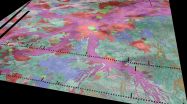(Press-News.org) A survey carried out earlier this year has found the first evidence of the 'superbug' bacteria Methicillin-Resistant Staphylococcus aureus (MRSA) in sausages and minced pork obtained from supermarkets in the UK. However, researchers stress that this does not pose a significant immediate risk to the public.
In February, a team of researchers funded primarily by the Medical Research Council (MRC) bought and analysed a total of 103 (52 pork and 51 chicken) pre-packaged fresh meat products, labelled as being of UK farm origin, from supermarkets in five different locations across in England.
All of the meat products were frozen at -20?°C and sent to the Department of Veterinary Medicine at the University of Cambridge for testing. After thawing, researchers disinfected the exterior packaging before removing the meat. They then tested a 10g sample of meat from each packet and screened for MRSA. Two of the pork samples - one from sausages, one from minced pork - tested positive for MRSA; the sausage sample contained two strains of the bacteria.
In collaboration with the Wellcome Trust Sanger Institute an analysis of the genetic make-up of the bacteria and confirmed the presence of antibiotic resistant genes. The analysis showed that the bacteria belonged to a type of MRSA known as LA-MRSA CC398, which has emerged over the last few years in continental Europe, particularly in pigs and poultry, but was not previously believed to be widely distributed in the UK.
In many countries, LA-MRSA CC398 represents an occupational risk for those in close contact with livestock, particularly pigs and veal calves. Humans in contact with pigs (farm workers, abattoir workers and veterinarians, etc.) have significantly higher rates of the bacteria in their nasal carriage, according to epidemiological studies, for example. Other studies have revealed an association between clinical disease resulting from LA-MRSA CC398 infection and recent contact with pigs or pig farms. As with other MRSA, this type may be responsible for serious illness following wound or surgery site infections, although many people will carry MRSA on their skin or in their noses without showing signs of disease.
The researchers stress that adequate cooking (heating above 71°C) and hygienic precautions during food preparation should minimise the likelihood of transmission to humans via contaminated pork. However, they argue that the discovery of MRSA in pork identifies a potential way that the bacteria can spread from farms to the wider population.
While human contamination of carcasses or meat products in the abattoir or at the meat packing plant may occur, there is good evidence that these isolates are of animal origin - possibly through the use of antibiotics to treat or control infection in livestock.
As the tests use a highly sensitive method of detection of bacterial contamination, the numbers of MRSA bacteria present may be low. The researchers say that as the two infected samples contained processed pork (sausages and minced pork), they cannot rule out that the meat packing plants from which the MRSA from this study originated also handle imported meat. If this were the case, it is conceivable that cross-contamination might have occurred between non-UK to UK sourced meat.
Dr Mark Holmes from the Department of Veterinary Medicine at the University of Cambridge says: "This is the first time that MRSA has been detected in retail meat products in the UK. The public should not be overly worried by this as sensible food precautions and good hygiene should prevent its spread. It's also usually pretty harmless and only causes health problems if it infects someone in poor health or gets into a wound.
"However, this does suggest that MRSA is established in our pig farms and provides a possible route of transmission from livestock, through those in direct contact with pigs, into the wider population."
Dr Des Walsh, Head of Infections and Immunity at the MRC, added: "Studies like this are crucial not just to reveal concerns to human health through contaminated livestock, but to show resistance to antibiotics is a problem growing far beyond just humans. To win the fight against antimicrobial resistance, we need an all hands on deck approach, and that's why we've teamed up with leading experts in biological, social and others sciences in a joint initiative designed to find new solutions, fast."
The research was funded by the Medical Research Council, with additional support from the Alliance to Save our Antibiotics. The results of the study are published in the online journal Eurosurveillance.
Dr Holmes was recently awarded a further £1.58 million from the MRC to look into the effects of antibiotic use on the entire population of animal gut flora, not just the disease causing bacteria. His work, using research in pigs, will help scientists understand the evolution of antibiotic resistance and help to make better choices about how to reduce the spread of antimicrobial resistance on farms.
INFORMATION:
PITTSBURGH, June 17 -- Regardless of chronological age, people who live in neighborhoods with high crime, noise and vandalism are biologically more than a decade older than those who do not, according to a study led by researchers from the University of Pittsburgh. The findings were published online today in PLOS One.
Strong research evidence supports that living in disadvantaged neighborhoods has an unfavorable impact on mental and physical health, explained lead author Mijung Park, Ph.D., M.P.H., R.N., assistant professor, University of Pittsburgh School of Nursing. ...
High in the sky where the cirrus ice crystal clouds form, jet contrails draw their crisscross patterns. Now researchers have found that these elevated ice cloud trails can influence temperatures on the ground and affect local climate, according to a team of Penn State geographers.
"Research done regarding September 2001, during the three days following 9-11 when no commercial jets were in the sky, suggested that contrails had an effect," said Andrew M. Carleton, professor of geography. "But that was only three days. We needed to look longer, while jets were in the air, ...
Scientists at UCL have observed how a widespread polar wind is driving gas from the atmosphere of Saturn's moon Titan. The team analysed data gathered over seven years by the international Cassini probe, and found that the interactions between Titan's atmosphere, and the solar magnetic field and radiation, create a wind of hydrocarbons and nitriles being blown away from its polar regions into space. This is very similar to the wind observed coming from the Earth's polar regions.
Titan is a remarkable object in the Solar System. Like Earth and Venus, and unlike any other ...
(WASHINGTON, June 18, 2015) - New research published online today in Blood, the Journal of the American Society of Hematology (ASH), concludes that a blood clot in an abdominal vein may be an indicator of undiagnosed cancer. The study also suggests that these clots predict poorer survival in patients with liver and pancreatic cancer.
Compared to the general population, individuals who develop blood clots in their legs (deep-vein thrombosis, or DVT) or lungs (pulmonary embolism, or PE) are two to four times more likely to be diagnosed with cancer within the next year. ...
Global warming leads to the ice sheets on land melting and flowing into the sea, which consequently rises. New calculations by researchers from the Niels Bohr Institute show that the sea level in Northern Europe may rise more than previously thought. There is a significant risk that the seas around Scandinavia, England, the Netherlands and northern Germany will rise by up to about 1½ meters in this century. The results are published in a special issue of the scientific journal Climate Research.
Sea level rise is a significant threat to the world's coastal areas, ...
Astronomers making a detailed, multi-telescope study of a nearby galaxy have discovered a magnetic field coiled around the galaxy's main spiral arm. The discovery, they said, helps explain how galactic spiral arms are formed. The same study also shows how gas can be funneled inward toward the galaxy's center, which possibly hosts a black hole.
'This study helps resolve some major questions about how galaxies form and evolve,' said Rainer Beck, of the Max-Planck Institute for Radio Astronomy (MPIfR), in Bonn, Germany.
The scientists studied a galaxy called IC 342, some ...
Patients seeking certainty in genetic tests often receive a perplexing result. Many learn they carry a 'variant of unknown significance' of a disease-linked gene. Such variants might -- or equally might not -- increase disease risk.
A study published in the June issue of the journal Genetics characterized nearly 2000 variants of the breast cancer-associated gene BRCA1, demonstrating the potential of a new approach for sorting out which variants are harmful and which are harmless.
Because genetic tests increasingly use more comprehensive multi-gene and whole-genome sequencing ...
ALLENDALE, Mich. -- A Grand Valley State University biology professor and her team of scientists have determined new information about an endangered species in the U.S., which could impact its protection under the Endangered Species Act.
The study, "Two Tickets to Paradise: Multiple Dispersal Events in the Founding of Hoary Bat Populations in Hawai'i," was recently published in PLOS ONE at http://journals.plos.org/plosone/article?id=10.1371/journal.pone.0127912.
The study, led by Amy Russell, associate professor of biology at Grand Valley, reveals that the Hawaiian ...
(Philadelphia, PA) - A little more than a decade ago, researchers discovered that all cells secrete tiny communications modules jammed with an entire work crew of messages for other cells. Today, a team of researchers, led by stem cell researcher Raj Kishore, PhD, Director of the Stem Cell Therapy Program at the Center for Translational Medicine at Temple University School of Medicine (TUSM), is harnessing the communications vesicles excreted by stem cells and using them to induce the damaged heart to repair itself. Their research is the June 19 cover story in the leading ...
PROVIDENCE, R.I. [Brown University] -- An international team of scientists has found some of the best evidence yet that Venus, Earth's nearest neighbor, is volcanically active.
In combing through data from the European Space Agency's Venus Express mission, the scientists found transient spikes in temperature at several spots on the planet's surface. The hotspots, which were found to flash and fade over the course of just a few days, appear to be generated by active flows of lava on the surface.
"We were able to show strong evidence that Venus is volcanically, and thus ...


